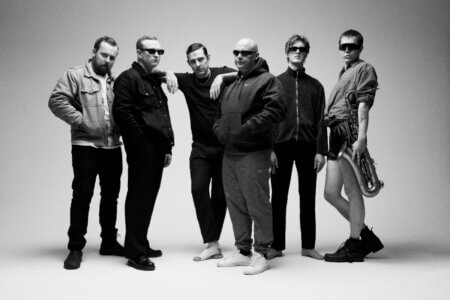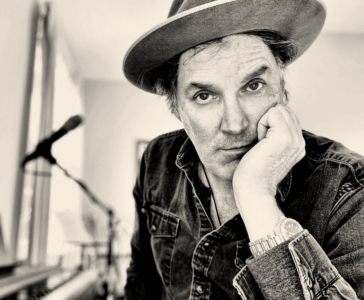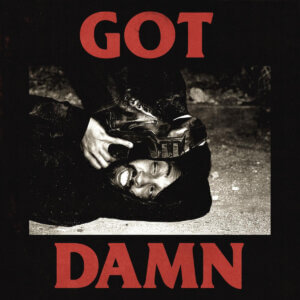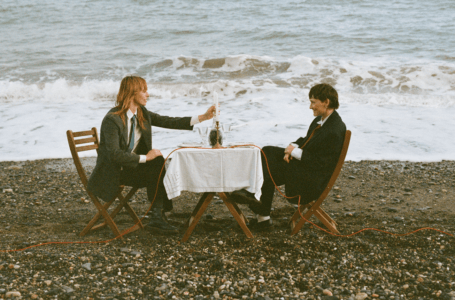Men Without Hats Interview
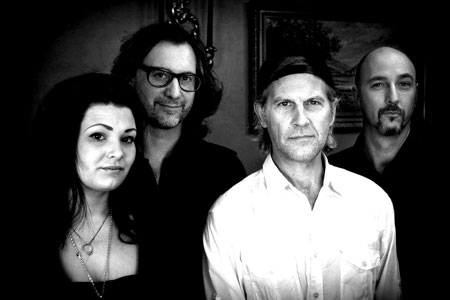
Charles Brownstein originally from Montreal, was pretty psyched to catch up with Ivan (also originally from Montreal) from Men Without Hats to talk about their forthcoming album entitled “Love in the Age of War”: their first album in ten years.
CB: I was really curious to ask Ivan about getting back to making music again. It had been about ten years since the last record as well as working with Dave “Rave” Ogilvy who’s known for working with a bit more heavy artists such as Nine Inch Nails, and of course, Skinny Puppy.
Ivan: It kind of happened naturally, and happened after the tour. The tour was basically me wanting to get back into it. I’ve been sitting around at home, being a stay-at-home dad for the last ten years, and so my son was almost 10, he can take care of himself now, so I have a lot of free time and I was just itching to get back into the business. I missed it so much, so the tour was a great first step for me, to get back into it, and on the tour… I guess it was just an opportunity to get back into Men Without Hats kind of situation, and I started to write songs again—they just started to pour out of me. I spent the last tour in the back of the bus with my iPad, writing a bunch of songs on Garage Band, and that became the new record. So, we didn’t set out to tour, and then do an album, it just came naturally. I started writing songs, and our manager said “Hey, you’ve got a lot of songs, you should make a record”, and that’s what we did. First of all, he delivers the good when you work with him, and secondly, he’s produced Rational Youth, the Skinny Puppy stuff, Images in Vogue… so he’s done a lot of the big Canadian new wave acts, and I guess this was the only one missing for him. Just the fact that he was out here and we have friends in common (he’s from Montreal too), we’d never met, but we both knew of one another.I’m being managed by John Kastner of the Doughboys, and Dave did a Doughboys record. I don’t remember which one it was, but he did one a while back and so, he knew John and they’d been talking, and when we finally met, we hit it off immediately.
In making this record, we set ourselves a kind of guideline. What would have happened if instead of making Pop Goes the World, I had made a record like a follow-up to Rhythm of Youth, you know? Or the Where Do the Boys Go record? What would have happened if I’d kept in that same vein, instead of going as we went into Pop goes the World, as midi appeared on the scene, and computers appeared, and the whole game changed when we made Pop Goes the World, as far as techno was concerned, and technology just got so advanced. So my goal with Pop Goes the World was to make a super orchestral record, but with keyboards, and I totally achieved what I set out to do. With this record, we wanted to see what would happen if we’d kept along the same lines, with the same gear, the same type of songs, and that’s what we did: see, I’d always been curious myself, what if I’d stayed instead of branching off? What if I’d stayed in that electro-pop sort of vein? So that’s how we made this record: pretending we were back in the 80s, working on the 24-track boards, so we didn’t give ourselves infinity amount of tracks like you can do now—we limited ourselves, limited the amount of keyboards we put on so it would sound like back then. You know, back then there was no midi, there was no sequencing. Every line that I played, I played live if I wanted to double track the line to stack another sound, I had to replay it and record another line on top of it. There was nothing. So, that’s basically how we approached this record. Back in the 80s, when we put a sound down on a track, it had to be a good sound.We weren’t able to stack 6 or 7 keyboards together, and we had to make sure that every single sound was the best we could come up with, and that’s how we approached this record. Instead of stacking 3,000 keyboards, we just tried to find one really good one, and we used most of the same gear we used back then. The main keyboard was the Yamaha CS50 that I used to play front
and centre stage while I was singing, and that’s the keyboard we used for most of the songs on this record.
CB: You’ve always been into the electronic/techno sound, but I was going to ask you how working in the studio today is compared to back in the day?
Ivan: That’s basically it, you know. The differences are that first of all, everyone has a studio— anyone with a computer’s got a studio these days, so the whole “studio” atmosphere isn’t quite a dying art, they’re still around, but less and less records are being made in them, unfortunately.I guess the main thing that’s changed is that there aren’t any record stores anymore. That’s one thing that someone asked me, “Where’s your record coming out?” and I said, if you can get connection on the moon, you can get our record. My first three records didn’t even come out on CD, and there aren’t really even CDs anymore. Sure, they’re still being printed, but we’ll probably sell more on vinyl. It’s all on audio files now, but the people who are buying vinyl are really concerned: fans are asking us what kind of printing they’re going to be on, because they probably have $2000 turntables. It’s just another facet of this whole thing. In some ways it’s good, in some ways it was easier back then and in some ways it’s easier now. The whole business is really cyclical too, always a constant flow of majors. There are new styles of music coming up, and little independent labels being created and then being sucked up by the majors, and then the whole thing starts over again. It’s a cyclical business.
CB: The music industry has changed so much… where do you see it going from here?
Ivan: I think there’s going to be a move backwards. I’m sort of seeing that all over the place now. Companies are springing up now, little niche companies delivering a service that used to happen 20 years ago, that doesn’t really happen anymore, but that the people really like.Just like turntables: people are going to make a lot of money making them again, and I think there will be a lot of things like that. People are going to realise that progress is one thing, but when it comes at the expense of something that used to work and now we get something that’s supposedly “better” but it’s really just for the profit margin, I think people are gonna start demanding better service and better things, saying “I don’t care if it costs more, I just want it to
work”… and I think the industry is going to work like that too.
The thing is that our whole society… capitalism is based on consumerism, and people are being conned into stuff that doesn’t exist, they’re in a cloud. All their movies, the payment is in the cloud… and at one point— I don’t know but I see it as a possible scenario—people are going to say “Hey, I’m spending all of this money, but I’ve got nothing to show for it. I want to have something to show for it, I want to have a shelf full of DVDs, a big rack full of records again, a huge system with huge system with huge speakers. I don’t want little speakers, I want BIG speakers, I want a BIG table”. That could happen, because like I say, we have a new generation of kids who don’t want to be bothered by carrying around a CD. The last thing they want to do is have 3 or 4 CDs to carry around with them. What’s also happening now is that people are realizing… like, I read this article recently about a woman who went into a classroom and met a bunch of students, and asked them how they thought, since they expect everything for free, asked them how they thought their favourite artists should get compensated. The kids mostly said “I would tell my friends about it”, and the person said “yeah, but if your friends are all getting it for free too, the artist still isn’t getting compensated”… and the kids were drawing a blank. They didn’t really get the concept. They didn’t understand that the artists depend on that for their livelihood. They just were born into a society where things are free: they can go online and just download it. Less and less now, but for an entire generation of people, file-sharing was a god-given right. That attitude will change, when people get tired of holding their iPhone up when they go to a show, and they’ll realise they just should have watched the show instead of spending the whole show with their arm in the air so they could watch it later on a crummy little screen with crummy little speakers. Why didn’t you just pay attention while you were there?
CB: Are you amazed at the “staying power” of your music? I mean, I’ve seen your music around, I see it on TV and in films and stuff and it’s still going strong; it’s still popular to this day.
Ivan: Yeah, well, that was another thing that made it possible for me to come back. About two years ago, I was sitting around and it was on Glee, it was in advertising, it was in movies like Time Machine… it’s just all over the place. There was that, and then there was any time I’d turn on the radio, every other new song I listened to had synthesizers and 80s drum kicks in it, and it just seemed like the right thing to do, the right timing. I wanted to get back, and I had all of these tools at my disposal, so it all sort of came together. I think I’m truly blessed for the staying power of these songs. Every time someone uses them, I’m just amazed, really. I totally realised that I’m one of the fortunate ones: it’s a really hard business, and I’ve always said that if my son wants to get into the music industry, he’s gonna be a lawyer. It’s a hard business. It’s a business where if you want to have any kind of security, don’t be a musician—don’t be an artist. Be a doctor or something like that. There’s always going to be sick people, so there’s guarantees there… but in music, in the arts, there’s no guarantee. It’s a crapshoot every time you wake up in the morning. Every time you write a song, it’s a crapshoot. I’m one of the lucky ones, and I thank my stars every morning that people still like my music, because I see so much heartache out there, with so many people who have put their lives into their music and just … it never happened, and for me, that’s one of the saddest things. I’m a vinyl junkie. Aside from music, my other hobby is music, and so I listen to a lot of early 70s progressive music, and I listen to these guys pouring their lives into this thing that might have sold ten copies, and no-one knows about them. Sometimes I find it so beautiful, and sometimes I find it so sad. The people that do it, I have nothing but admiration for artists, because having done it, and having been a success… it’s like the NHL, you know? How many jobs are there in the NHL? Maybe five or six hundred?How many hundreds of thousands of kids are trying every year to fill those five hundred positions? It’s sad, that so many kids end up by the wayside, and the same thing happens with music. I’m sure it happens all over the place, but it’s mostly in the music and entertainment business where a lot of dreams get shattered.
CB: I was curious as to whether you remember when you came up with the hook for “Safety Dance”?
Ivan: I definitely remember. Are you talking in particular about the “bleeps” at the beginning? Is that what you’re talking about?
CB: Yeah, I think so—I mean, everybody knows that part.
Ivan: When we made that remix, it was like, the label said to us that we had to do a dance remix of the song, and nobody knew what that was. We were told that there were a lot of them out there, and that we should just go and listen to some remixes and then do the same things. So, basically that’s all we had to go on. We just listened and then did it, and those ideas… I did the spoken word part of it because I was a big fan of Grand Master Flash, and that was my “rap”, that was my white-boy rap… to the point that we played once in Poughkeepsie, New York, and a girl came up after the show and said to me, “I almost didn’t come to see you because I thought you were black”… so my white-boy rap must have worked. That’s where all of that came from, I guess. Just going with what I knew.
www.menwithouthats.com
www.facebook.com/menwithouthats
www.myspace.com/menwithouthatsrules
Latest Reviews
Tracks
Advertisement
Looking for something new to listen to?
Sign up to our all-new newsletter for top-notch reviews, news, videos and playlists.





